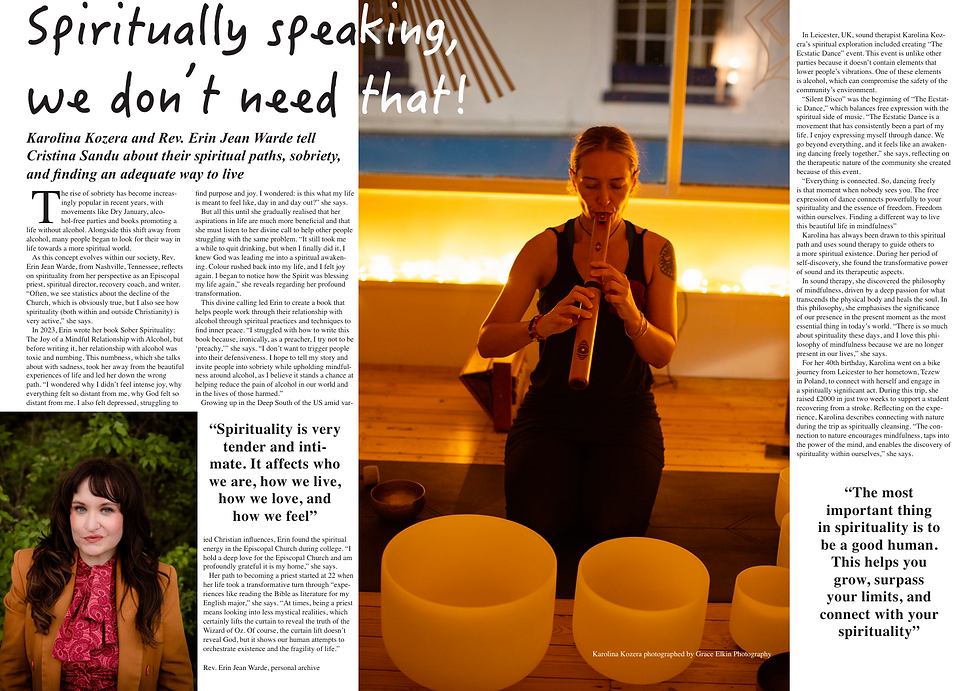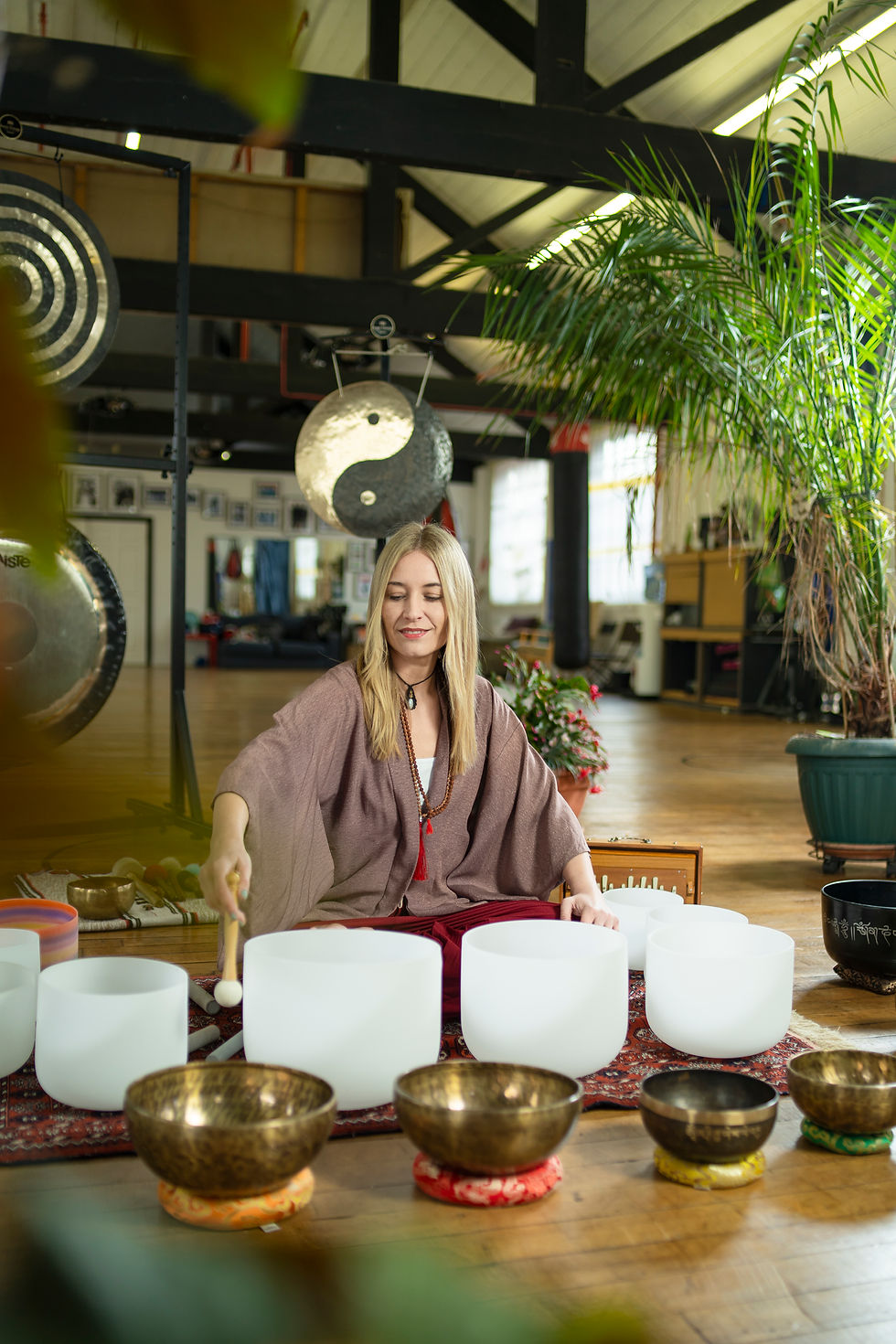Spiritually speaking, we don’t need that!
- Cristina Sandu

- Jun 6, 2024
- 4 min read
Updated: Aug 4, 2024
Karolina Kozera and Rev. Erin Jean Warde tell Cristina Sandu about their spiritual paths, sobriety, and finding an adequate way to live
The rise of sobriety has become increasingly popular in recent years, with movements like Dry January, alcohol-free parties and books promoting a life without alcohol. Alongside this shift away from alcohol, many people began to look for their way in life towards a more spiritual world.
As this concept evolves within our society, Rev. Erin Jean Warde, from Nashville, Tennessee, reflects on spirituality from her perspective as an Episcopal priest, spiritual director, recovery coach, and writer. “Often, we see statistics about the decline of the Church, which is obviously true, but I also see how spirituality (both within and outside Christianity) is very active,” she says.
In 2023, Erin wrote her book Sober Spirituality: The Joy of a Mindful Relationship with Alcohol, but before writing it, her relationship with alcohol was toxic and numbing. This numbness, which she talks about with sadness, took her away from the beautiful experiences of life and led her down the wrong path. “I wondered why I didn’t feel intense joy, why everything felt so distant from me, why God felt so distant from me. I also felt depressed, struggling to find purpose and joy. I wondered: is this what my life is meant to feel like, day in and day out?” she says.
But all this until she gradually realised that her aspirations in life are much more beneficial and that she must listen to her divine call to help other people struggling with the same problem. “It still took me a while to quit drinking, but when I finally did it, I knew God was leading me into a spiritual awakening. Colour rushed back into my life, and I felt joy again. I began to notice how the Spirit was blessing my life again,” she reveals regarding her profound transformation.
This divine calling led Erin to create a book that helps people work through their relationship with alcohol through spiritual practices and techniques to find inner peace. “I struggled with how to write this book because, ironically, as a preacher, I try not to be ‘preachy,’” she says. “I don’t want to trigger people into their defensiveness. I hope to tell my story and invite people into sobriety while upholding mindfulness around alcohol, as I believe it stands a chance at helping reduce the pain of alcohol in our world and in the lives of those harmed.”
“Spirituality is very tender and intimate. It affects who we are, how we live, how we love, and how we feel”
Growing up in the Deep South of the US amid varied Christian influences, Erin found the spiritual energy in the Episcopal Church during college. “I hold a deep love for the Episcopal Church and am profoundly grateful it is my home,” she says.
Her path to becoming a priest started at 22 when her life took a transformative turn through “experiences like reading the Bible as literature for my English major,” she says. “At times, being a priest means looking into less mystical realities, which certainly lifts the curtain to reveal the truth of the Wizard of Oz. Of course, the curtain lift doesn’t reveal God, but it shows our human attempts to orchestrate existence and the fragility of life.”
In Leicester, UK, sound therapist Karolina Kozera’s spiritual exploration included creating The Ecstatic Dance event. This event is unlike other parties because it doesn’t contain elements that lower people’s vibrations. One of these elements is alcohol, which can compromise the safety of the community’s environment.
"Silent Disco was the beginning of The Ecstatic Dance," which balances free expression with the spiritual side of music. “The Ecstatic Dance is a movement that has consistently been a part of my life. I enjoy expressing myself through dance. We go beyond everything, and it feels like an awakening dancing freely together,” she says, reflecting on the therapeutic nature of the community she created because of this event.
“Everything is connected. So, dancing freely is that moment when nobody sees you. The free expression of dance connects powerfully to your spirituality and the essence of freedom. Freedom within ourselves. Finding a different way to live this beautiful life in mindfulness,” she says.
Karolina has always been drawn to this spiritual path and uses sound therapy to guide others to a more spiritual existence. During her period of self-discovery, she found the transformative power of sound and its therapeutic aspects.
In sound therapy, she discovered the philosophy of mindfulness, driven by a deep passion for what transcends the physical body and heals the soul. In this philosophy, she emphasises the significance of our presence in the present moment as the most essential thing in today’s world. “There is so much about spirituality these days, and I love this philosophy of mindfulness because we are no longer present in our lives,” she says.
“The most important thing in spirituality is to be a good human. This helps you grow, surpass your limits, and connect with your spirituality”
For her 40th birthday, Karolina went on a bike journey from Leicester to her hometown, Tczew in Poland, to connect with herself and engage in a spiritually significant act. During this trip, she raised £2000 in just two weeks to support a student recovering from a stroke. Reflecting on the experience, Karolina describes connecting with nature during the trip as spiritually cleansing. “The connection to nature encourages mindfulness, taps into the power of the mind, and enables the discovery of spirituality within ourselves,” she says.
Magazine version written and designed by Cristina Sandu:









Comments